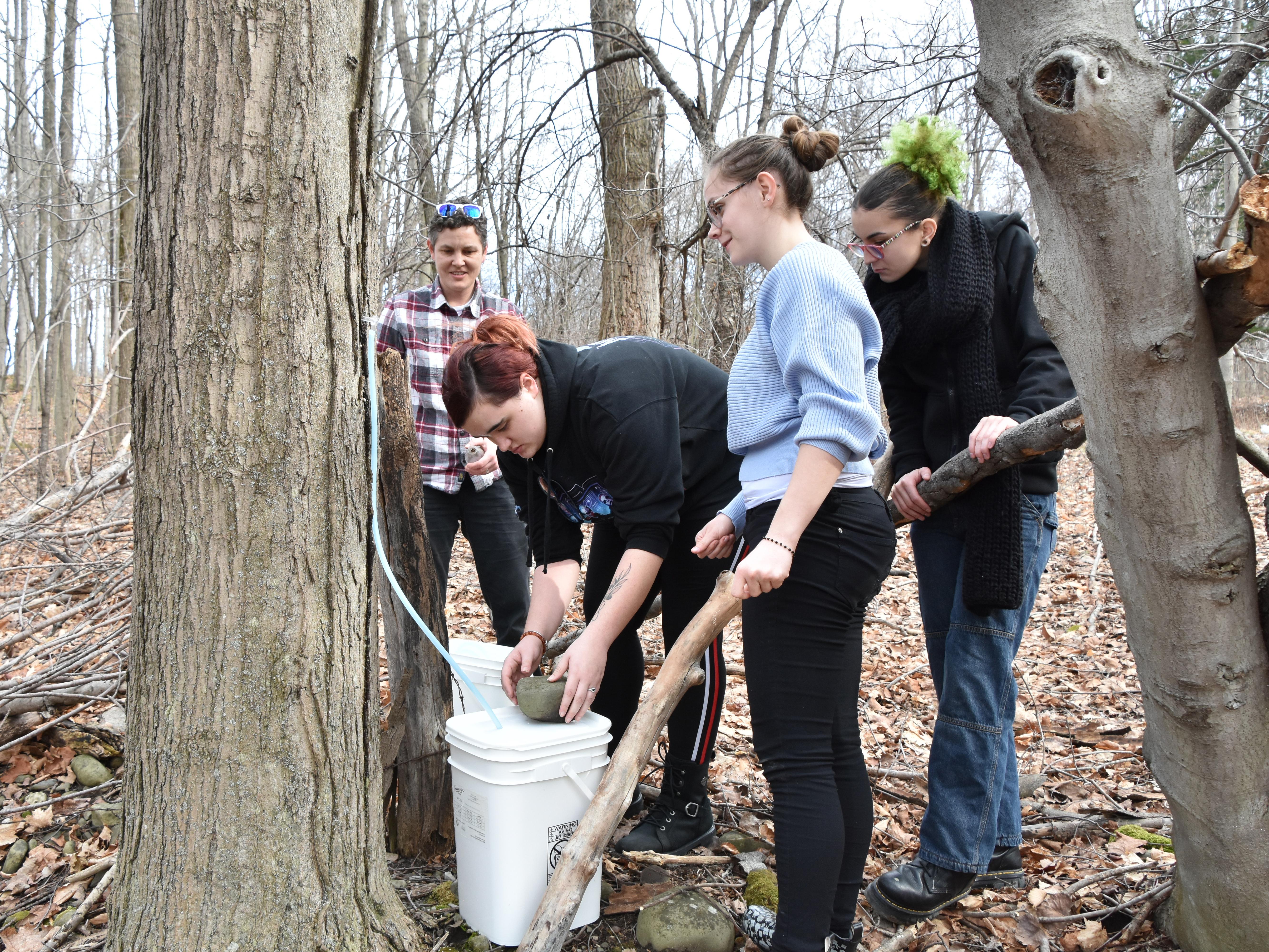SUNY Oswego's Sustainability Office and students from a Native American studies class taught by Michael Chaness recently gathered maple sap that will become syrup for an April campus community event catered by Auxiliary Services. From left are Kate Spector, the university's sustainability manager, with students Ariana Keller, Lorissa Williams and Janelle Esler.
SUNY Oswego’s Sustainability Office and Auxiliary Services partnered with a Native American studies class taught by Michael Chaness in this year’s maple tapping event that will result in maple syrup for the campus and community.
This year is the third year SUNY Oswego has hosted maple tapping, where students and staff collect sap from local trees. The Sustainability Office has worked to grow this project over the past few years, causing this year’s tapping the largest yet.
“We’ve gone from having this steel metal bucket system on seven trees, to having 54 taps out now at Fallbrook,” said Jon Mills, the university’s sustainability coordinator.
Steve McAfee, the executive director of Auxiliary Services, said last year their goal was to make two gallons of maple syrup, but this year their goal is to make 14 to 15 gallons, which would require about 600 to 700 gallons of sap.
“We have just under 300 gallons of sap being stored in the commissary right now,” Mills said. “And the ratio for boiling sap to syrup is about 40 gallons to one gallon. So you need 40 gallons of sap to get the one gallon of syrup.”
Maple season is very dependent on the weather, and this year’s weather was perfect. The trees were running really well, Mills said.
“You really want to look for freezing at night and thawing during the day,” Mills said. “You want these days where it is cold at night, but it’s going to be warm during the day. That’s the perfect time.”
Learning by doing
This year, Chaness invited his class to come to the maple tapping and experience what they learn about in their Native American studies class.
“There’s nothing like getting your hands dirty. There’s nothing like going out into nature and touching the tree,” Chaness said. “You’re part of the process and you understand that you’re taking something.”
This was a way to provide the students with a much more hands-on experience, rather than just sitting in the classroom reading about the history of maple tapping.
Max Ali is interning with the Sustainability Office and also is a student in Chaness’s class, so his involvement in this year’s tapping supported both experiences.
“We were able to see sap dripping into the bucket right in front of our eyes, and I think that was the most satisfying part for the students,” Ali said.
Mills, Chaness and McAfee all emphasized that this process is about taking what the trees are giving, but not taking more than we need.
“Another part of indigenous theology is you don’t take more than you need,” Chaness said. “Even though the trees are meant to be tapped, the sap will run if you tap it, so you still don’t take more than you need.”
Auxiliary Services and the Sustainability Office are working together to put together a brunch on Saturday, April 22, from 9 a.m. to noon at Fallbrook Lodge to provide the campus and community an opportunity to try the maple syrup.
In addition to the syrup, McAfee said the brunch will feature pancakes, sausage and coffee, as well as a gluten-free option for those who need it.
Tickets for the brunch cost $10 per person; children under 5 attending eat for free but will still need to have a pre-sale ticket. Visit tickets.oswego.edu to make reservations.
-- Written by Gabrielle Kroeger of the Class of 2023




